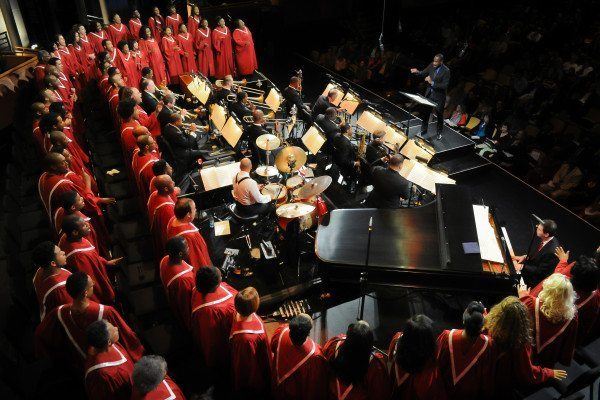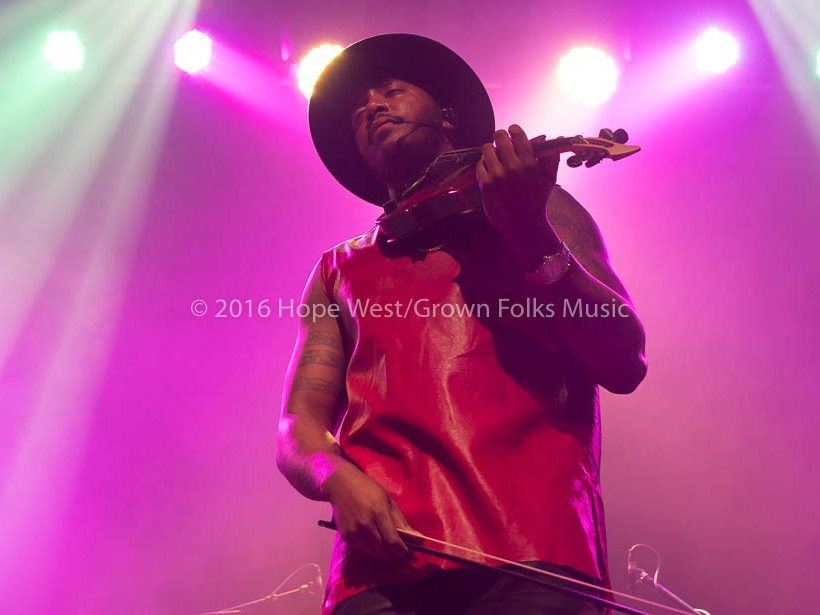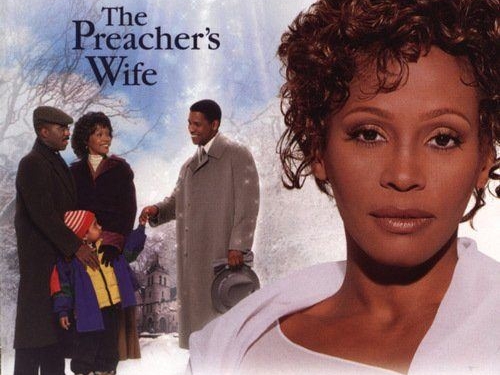
Nine-time, Grammy Award and Pulitzer Prize winning composer, trumpeter and artistic director of Jazz at Lincoln Center, Wynton Marsalis, was commissioned to write a piece in commemoration of the 200th Anniversary of Harlem’s Abyssinian Baptist Church. The result is The Abyssinian Mass, a landmark collaboration of jazz, gospel, instrumentation and vocals, and Marsalis first original recording in six years.
The album also features pianist, organist, conductor, composer, producer, arranger, vocal coach, professor and arts educator Damien Sneed. Sneed, recipient of the prestigious Sphinx Medal of Excellence, conducted the hand-picked 70-piece gospel choir Chorale Le Chateau in performing the mass. Grown Folks Music spoke with Sneed about the sweeping composition and the importance of the piece musically, culturally and historically. Read below and enjoy.
GFM: The Abyssinian Mass Piece was written by Wynton Marsalis, but it was executed by a choir that you directed hand picked. Tell us how you were brought onto the project.
Sneed: They were rehearsing for the project and I think it was maybe about three weeks before the world premiere and Wynton asked me to come over and help him with a couple of the vocal parts. He just wanted me to listen to some of it. He knew my background with church music and gospel music and also jazz and classical. He wanted me to just listen to some of the stuff he was writing. When I was standing there at the piano and he was sitting playing from his score, I actually starting singing some of the parts– soprano alto, tenor and bass. He said, ‘Wow, I didn’t know that you could sing and sing all of the parts. Could you actually go to the church tomorrow and rehearse with the choir?’ I did that and that’s how I ended up conducting the mass. I actually got a group of my singers, back then when we did it in 2009, to join with some of the Abyssinian Baptist Church choir members. But, when we did it recently for the recording back in 2013 for the tour, the group is called Chorale Le Chateau for my middle name– Damien Le Chateau Sneed. It’s a group of 70 singers that are from my alma mater, Howard University. [There also] people from Morgan State University in Baltimore, different people I’ve worked with over the years, people from the Juilliard school, [and] the Metropolitan Opera. We [also] have Broadway singers, gospel singers, Grammy award winners– it’s a great group of people in that group.
GFM: I was gonna ask you how you came up with that name, but you answered that. I was intrigued by that name.
GFM: As you just mentioned, you’re accomplished yourself as a composer and as a musician. But, had you ever encountered a piece quite like this one?
Sneed: No, I’d never, ever encountered a piece [like this]. The unique thing is for a while, people tried to put me in a box and say I should focus on classical music, or I should only focus on jazz or only focus on gospel. But, this piece actually seems like it was perfect for me and so apropos. [It was] serendipitous even, because it incorporates all those styles of music. When I was coming up and growing, musically and in school, there was never even anything like that around. So, I never even knew that was a possibility. It’s really amazing because the piece has so many different styles and genres in it. It’s perfect with my career and what I’ve tried to do myself as an artist moving forward in excellence in classical music, the gospel world, in jazz and American music as a whole.
GFM: When Mr. Marsalis asked you to help out, did you change anything? How challenging was it to coordinate the choir in terms of being able to perform the piece?
Sneed: That’s a good point and that was the challenge. That’s why he even asked me to help out. It was difficult for other people to communicate to the singers how to correctly execute or sing something. For the classically trained singers, how do you go from singing ‘oooh’ [sings]… that type of sound… then going to a gospel sound and then jazz. There are three different ways that you sort of execute the sound. A lot of that [I] had to do by example and just tell them, ‘Okay, this is what is on the score and I believe the composer, Mr. Marsalis, meant for it to be sung like this. It gave me a wonderful opportunity to be able to shape some of the things too and then I was able to go back to him and maybe just give a suggestion, because he’s my mentor as well. That was the difficulty for me– to actually conduct my mentor’s piece and work with him and even have to say, ‘You know Mr. Marsalis, I think right here maybe if this notation was in the score, it may give them a better idea.’ It’s really amazing because he’s not a vocalist, but his writing for the vocal parts is really amazing for somebody that’s not a singer– even where he placed the range of each part. It was amazing.
GFM: We have gospel music now in the mainstream more than ever, but talk about why a piece like this is so important historically and culturally… this style of a piece.
Sneed: It’s very different in its own way. However, historically and culturally with our legacy and our heritage it falls around the 50th anniversary of Duke Ellington’s Sacred Concerts– when Duke Ellington did those in New York City– “Come Sunday”, “Heaven”, “Praise God In Dance” and also “Almighty God” on some of the movements. It also falls around the 50th anniversary of Mary Lou Williams’ mass that she wrote around the same time.
It’s important because that piece also holds that choral tradition, which is very much a part of the African American culture and gospel music with the choir. Even a lot of HBCUs (Historically Black Colleges and Universities) had that choral tradition. Me, being from the south– from Georgia, from Augusta– that’s really something around and I grew up immersed in that part of our culture as African American diaspora and in gospel music. It was common for you to go into your church and hear a hymn, hear a devotional song, hear a spiritual and hear gospel. It’s something that I grew up with in my Baptist church back home, but it’s something that has somewhat left the culture because now in gospel… even in churches… with technological innovation now people just have tracks and praise and worship. A lot of times the Black church tries to mimic, copy and emulate other cultures and they’re not really that astute in making sure that they keep their own culture and legacy to the forefront– but this piece really does that.
The Abyssinian Mass by the Jazz At Lincoln Center Orchestra, a double album plus bonus documentary DVD, with Wynton Marsalis featuring Damien Sneed, Chorale Le Chateau and special guest Reverend Dr. Calvin O. Butts, III is available now on Blue Engine records.
Check out the trailer for the album below.


